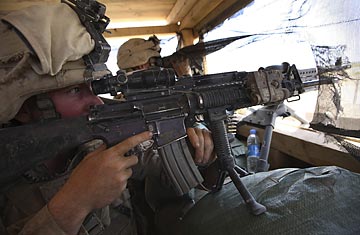
U.S. Marine Lance Corporal Shawn Brown mans a machine-gun post during a firefight in Afghanistan's Helmand province on Sept. 25, 2009
President Barack Obama is taking out a blank sheet of paper this week as he weighs his options in Afghanistan, and Congress stands more than willing to fill it in. The Senate on Sept. 29 is expected to debate amendments to the 2010 defense appropriations bill that are likely to include everything from timelines for withdrawal of U.S. troops from Afghanistan to proposals to send upwards of 40,000 more. But, unlike health-care reform, this isn't a decision Obama can leave in the hands of the Legislative Branch — however undecided he remains today.
Six months ago Obama called for a new strategy in Afghanistan, but the President now appears to be wavering in the wake of a report by his top commander there, General Stanley McChrystal, that says 10,000 to 40,000 more troops are needed or the mission "will likely result in failure." With his advisers split between advocating a full-scale counterinsurgency, which some Democrats say amounts to nation-building, and a more limited counterterrorism approach against the Taliban and al-Qaeda, Obama will now hold five more meetings of the National Security Council on the issue before making up his mind, National Security Adviser James Jones told the Washington Post. Jones emphasized there's no set deadline and that the President will "encourage freewheeling discussion" and "nothing is off the table."
The Administration spent much of last week distancing itself from McChrystal's recommendation. "There are other assessments from very expert military analysts that have worked on counterinsurgencies that are the exact opposite," Secretary of State Hillary Clinton told PBS's NewsHour. But with Centcom commander General David Petraeus and chairman of the Joint Chiefs of Staff Admiral Michael Mullen lining up behind McChrystal, some Republicans are accusing the President of risking the lives of the nearly 68,000 troops already in Afghanistan by "dithering," as the top Republican on the Intelligence Committee, Kit Bond, put it on Fox News Sunday. And there are inherent political dangers for Obama if he chooses to buck the advice of his military commanders. Fox News Sunday's host, Chris Wallace, went so far as to ask his guests if Obama could follow the Harry Truman mold that led to the firing of General Douglas MacArthur. "A half measure does not do justice," Senator John McCain said on ABC's This Week. "And time is important, because there's 68,000 Americans already there. And casualties will go up."
Along those lines, Republicans are expected to introduce a spate of amendments to this week's fiscal 2010 Defense Appropriations Act in the Senate. One will probably be a demand to have McChrystal testify before Congress — a move the Defense Department has so far resisted until after the Administration sets its policy. Other potential amendments include one to increase funding for troop training, an amendment expressing the sense of the Senate in support of troop increases and maybe even one expressly supporting McChrystal's recommendations. On the Democratic side, an amendment is expected, perhaps from Wisconsin Democrat Russ Feingold, that would set a timeline for withdrawing troops from Afghanistan.
"Many Democrats will say that we need to wait for the President to submit a plan," said a Democratic leadership aide. "Republicans will say, 'You didn't mind second-guessing George Bush on Iraq.' " Obama's dilemma is this: If he chooses to send more troops, he will have near united Republican support but will divide his own party; if he decides against a counterinsurgency strategy, he will be reversing a campaign promise uniting Democrats, the majority of whom are opposed to an expanded U.S. footprint in Afghanistan.
Still, in the end, Obama's decision will probably depend as much on politics in Afghanistan as on politics in Washington, especially given the disputed Afghan election. As President Bill Clinton said on Meet the Press: "I think that what the President has done here is not to dis [General McChrystal], but he's saying, 'Look, my responsibility is not just to win military battles, but to see that at least it's something bigger ... for ourselves and our security and for the people of Afghanistan. And I got to decide whether we got a partner there,' which means there has to be a functioning Afghan government."
